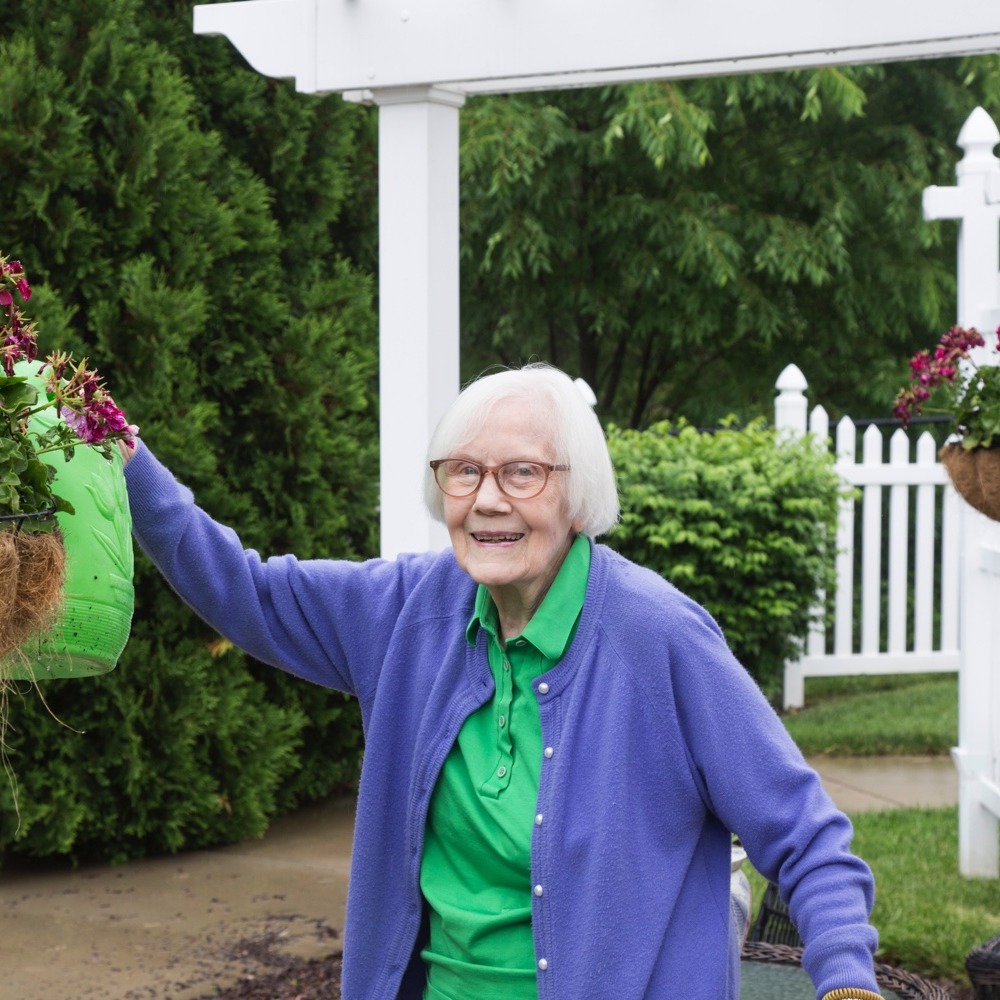While determining senior living costs can be difficult without assessing someone’s individual needs, you can get an insider view of what goes into senior living pricing, including:
A Complete Guide to Financial Planning for Senior Living
When considering senior living, emotions often takes center stage, but evaluating pricing is crucial to making the best decision for your loved one. If you haven’t yet considered costs, this guide is here to help.

But the next question is ... how do we pay senior living costs? And what is involved in senior living financial planning?
The answer depends on several different factors, including whether you’re just starting to think about the future or you have an immediate need. And that’s just for a start. There are misconceptions floating around that can make figuring out the best way to pay for senior living more difficult than it needs to be.
It’s easy to get wires crossed and not know what to believe. That’s why we’re diving into senior living financing, no matter what stage in the process you’re in.
Get answers from a senior living specialist—contact Cedarhurst.
In this guide, we’re covering:
- Out-of-pocket payments from savings and investments
- Insurance options, including long-term care insurance (LTCI)
- Home care loans and gap loans for immediate needs
- Reverse mortgage and home sales to dig into equity
- VA Benefits and what they cover
- Medicare and what it does and doesn't cover
Download a PDF version of this guide by filling out this form, or keep scrolling to read.


How to Pay for Senior Living Costs, from Out-of-Pocket to What Medicare Covers
(and What it Doesn't)
Out-of-Pocket (Private Funds)
For many people, the majority of their senior living costs are paid from private funds. Often the money comes from proceeds from investments, savings accounts, retirement plans, or inherited money.
If you’re still looking far into the future, but are worried about senior living finances, it’s never too early to start. You can roughly estimate what it would cost for assisted living, for example, and talk to a financial advisor about how much you’d need to save per month, or about possible investments that would need to be cashed out during retirement years.
If you’re a little closer to retirement and are even more worried about senior living finances, don’t panic. It’s never too late to prepare. Make that call to the financial advisor and determine your specific private-funds options.
Long-Term Care Insurance (LTCI)
A large number of people have realized that LONG-TERM CARE INSURANCE (LTCI) can ease their minds about future senior living expenses. While plans vary, LTCI generally ensures you’ll have enough to cover your senior living needs.
It’s true that LTCI POLICIES have helped many people pay for senior living, but consumers should be sure to understand the parameters and possible downsides before you take out a policy. As with all things, it’s not a cut-and-dry transaction where you pay a premium and they pay for your long-term care.
Note that:
- LTCI policies aren’t blanket, and they are meant to insure specific things for a fixed amount of money and a fixed period of time.
- It can be challenging to know exactly how much coverage you need. If a plan guarantees $200,000 in benefits, it might be sufficient for one person and insufficient for someone else. Either way, you could take the chance of wasting dollars that you’ll need.
- Policies vary widely with what they will cover and won’t cover. Don’t just chase low premiums. Look at exactly what’s covered to ensure you get what you pay for.
While LTCI is a solid option for paying for senior living, consult with an insurance provider or a financial advisor to make the best decision.
Third-Party Insurance
It’s common for seniors to have third-party insurance in addition to their Medicare. This is another avenue to travel when looking for ways to pay for senior living. It’s unlikely that any third-party insurance policy will pay for independent living fees, but policies may have benefits that cover assisted living, memory care, skilled nursing, and respite care.
Often, coverage comes with conditions. A third-party health insurance policy will likely require certain parameters to be met before coverage kicks in, such as providing coverage for only those insured individuals who need help with at least two ACTIVITIES OF DAILY LIVING (ADLS).
Then, insurance will cover the cost of support a senior needs with:
- Grooming
- Bathing and dressing
- Incontinence management
- General mobility
Additionally, you may need to provide documentation from a physician to get the coverage approved.
Life Insurance
If you or your loved one has an existing life insurance policy, you may be able to convert an in-force policy to a pre-funded account. This is a relatively common practice, and it’s surprisingly uncomplicated for an insurance policy.
Usually, all health conditions are accepted and there are no:
- Waiting periods
- Care limits
- Costs to apply
- Premium payments or fees
Life insurance policies offer several options for accessing the cash built up in them. Seniors won’t get face value, but they typically net more than the policy’s surrender value. It’s a decent value that doesn’t have a ton of hidden downsides. It is what it is, and you get what you get.
Even though this process isn’t super complicated, as with any major financial decision, you should check with a financial advisor for details about payouts and tax considerations.
Home Equity: Reverse Mortgage and Home Sales
Accessing the equity in the family home can be an ideal way to pay for senior living. This is how many people assume they’ll pay for senior living when the time comes.
Whether it’s an OUTRIGHT HOME SALE or TAKING OUT A HOME EQUITY LINE OF CREDIT, home equity helps countless seniors finance their senior living expenses. While it’s common, accessing home equity has its downsides. Be sure to WEIGH ALL THE PROS AND CONS and consider what’s best for your family.
Your options also include something you’ve probably seen featured on countless TV commercials: the reverse mortgage. If you’re worried about your ability to cover living expenses or otherwise meet financial obligations but selling a home is not an option, a reverse mortgage can provide the life raft you need. But there’s not just one type of reverse mortgage.
Before you take the reverse mortgage route, get to know the types of available options:
- Home equity conversion mortgage (HECM): The most common type of reverse mortgage, an HECM is insured by the U.S. DEPARTMENT OF HOUSING AND URBAN DEVELOPMENT (HUD). People usually prefer this option because there are no income or medical requirements. Funds can be used for any purpose, and there are different payment options, making it flexible for a larger group of people.
- Single-purpose reverse mortgage: The SINGLE-PURPOSE REVERSE MORTGAGE OPTION is the most affordable. They’re offered by state, local, and other agencies and come with caveats: the funds must be used to pay for something specific and lender-approved.
- Proprietary reverse mortgage: Proprietary reverse mortgages are not overseen or insured by the FHA, and they are reserved for higher-value homes. Because they aren’t federally insured, they do not impose upfront or monthly mortgage insurance premiums.
Know exactly what you’re getting into, and consult a mortgage or financial expert before you give the green light to a reverse mortgage.
Bridge and Home Care Loans
If you’re looking to finance senior living costs because of an unexpected and a sudden emergency, bridge or home care loans can be helpful. These loans provide a bridge to cover the costs during the transition to senior living.
It’s a short-term loan that will need to be repaid once the funds are available, such as from the sale of a house or cashing in an investment. Bridge and home care loans have helped families ensure that their loved one is well taken care of while they take action on more permanent financial arrangements.
Veterans Benefits
The DEPARTMENT OF VETERANS AFFAIRS provides the VA AID AND ATTENDANCE PENSION to eligible wartime veterans and their surviving spouses. This aid can offset the price of senior living by a significant amount.
To qualify, VA AID CANDIDATES must be:
- Signed up for VA health care
- Have VA approval for the care and service
- Living in an area where necessary services are available
Veterans benefits can help seniors ensure they maintain their quality of life no matter what their care needs are.
VA Aid and Attendance and Housebound Allowances
Additionally, some veterans and their surviving spouses are eligible for an AID AND ATTENDANCE AND HOUSEBOUND ALLOWANCE. Often just referred to as VA assisted living benefits or improved pension, Aid and Attendance and Household benefits help senior and disabled veterans pay for senior living, including assisted living and memory care services.
Veterans can only qualify for either Aid and Attendance or Household, but not both. However, each allowance can mean thousands of dollars a year to help veterans pay for senior living expenses. Qualifying for these benefits is dependent on your MAXIMUM ANNUAL PENSION RATE (MAPR) amount.
Veterans benefits can help seniors ensure they maintain their quality of life no matter what their care needs are.
Medicare: Don’t Assume It Will Cover Senior Living (Because It Won’t)
Too many seniors assume that Medicare will cover their senior living costs—BUT IT DOESN’T. While MEDICARE WILL HELP PAY FOR SERVICES a senior receives in a senior living community, it won’t pay for actually living there.
This sounds like splitting hairs, but it’s how Medicare works, and it’s important for seniors and their families to understand. Unfortunately, too many people still assume that their Medicare coverage will pay for living in a senior living community, leaving them unprepared to pay for something they thought was already going to be taken care of.
Good to know: Medicare will cover things like SHORT-TERM STAYS.
This is why many people turn to LTCI and MEDIGAP POLICIES to fill the gaps between senior living costs and the medical services costs.
It’s also important to note that not all senior living communities accept Medicare. If you’re depending on Medicare to pay for your loved one’s medical expenses while in senior living, first check to make sure the community takes Medicare.
Is it Time to Talk About Independent Senior Living?
Even if you, your parent, or your loved one require no special care at all, independent senior living is still an ideal option for many.
Why would someone who doesn’t need assistance with daily activities move into an independent living community? Because independent living in senior living communities is just awesome! Picture it:
- No household maintenance
- No yard to landscape
- No housework (unless you want to)
On top of these perks, add in tons of fun new activities and opportunities to grow your circle of loved ones, and what you have is a life well lived. Independent seniors can shed the hassle of maintaining a household and just do whatever they want. Even if they want to still clean their own apartment or drive to their own errands, independent senior living is all about choice and truly embracing an active life.
Is it Time to Talk About Assisted Living or Memory Care?
When most people think of having “the conversation” with a parent or loved one, they’re thinking of assisted living and memory care. While seniors who choose independent living don’t need a high level of care, seniors who do require more care can benefit from assisted living and often memory care services.
Ideally, the conversation starts far before the need arises. In a perfect world, the conversation about senior living is an ongoing one, where adult children and their parents agree about what is going to happen when one parent dies or gets sick, or how they’ll choose to downsize once they reach a certain age.
The reality is, most people prepare for the conversation after they notice a sign that it’s time, including:
- Behavior that becomes withdrawn after a period of living alone
- Unexpected weight loss
- A fall or other incident where the loved one’s health is put in jeopardy
- The parent or loved one starts letting grooming and hygiene go

Tax Benefits of Senior Living
It’s not surprising for most seniors that their medical expenses not covered by insurance or Medicare are tax deductible, as long as the itemized list of deductions exceeds 7.5 percent of a taxpayer’s adjusted gross income.
These deductions can make a big difference when it comes to paying for senior living, but it’s important to know what is tax deductible and what isn’t. Whether or not someone is in a senior living community, they can make specific deductions—including out-of-pocket costs—for:
- Doctors
- Psychiatrists
- Hospital visits
- Dental care
- Prescriptions
- Copays
- Eyeglasses
- Premiums for qualified long-term care insurance and other insurance
Memory Care Costs Are Fully Deductible
Most people become aware that there are tax deductions for long-term care insurance and other insurance premiums, while medical costs within senior living
communities are tax deductible. If your loved one is in a senior living community getting 24-hour care (such as memory care), the entire monthly cost of care is deductible.
Memory care services come with their own tax deductions. If your loved one is in a senior living community but is mostly there for non-medical care, the entire monthly cost isn’t deductible—just out-of-pocket medical expenses. However, if their senior living life requires a high level of care, such as memory care, it is deductible.
To put it in simply, if your loved one is in a memory care program and is being taken care of 24 hours a day because of Alzheimer’s or dementia, the monthly cost of a senior living community taking care of them is tax deductible.

Get the Senior Financial Planning Answers You Need
It’s good to have a lot of options, but figuring out which financial options work best for you can be a challenge. Talk to someone who understands senior living costs and senior living financial planning because they tackle the issue every single day.
Contact Cedarhurst to schedule a tour and get your questions answered. Or take a look through our senior living resources to find more answers to your senior living questions—we can even tell you where to get started.
Our teams have helped countless families navigate the senior living transition, and we love making some of the more stressful parts a little easier. We put our residents first, and that starts the minute you contact us.

Know What to Say (and When to Listen)
So ... what exactly do you say to even start the conversation?
Firstly, don’t start off by saying, “We want you to move into a retirement home.” Today’s senior living communities don’t bear much resemblance to the old stereotype of a “retirement home.” Senior living now happens in living, breathing, vibrant communities where people thrive.
Break the ice and warm up the conversation.
Start by asking questions that reflect your concerns, such as:
- How’s it going taking care of the house?
- How did your last visit with the doctor go? What did she have to say?
- Making meals for yourself every day is a lot of work, isn’t it?
If your parent or loved one has already expressed that they don’t want to talk about this topic, start off by recognizing that it’s hard to talk about by saying things such as:
- I know this isn’t something any of us like to talk about, but we really should. Your needs are the most important here—let’s discuss them.
- I know this isn’t a fun conversation for you, but I need to make sure you’re happy and safe.
- Can we talk about senior living again? I recently toured a community I think you’ll love.
If your parent or loved one previously talked about senior living but now has cold feet, warm up the conversation with the following:
- You loved the idea of not having to worry about the yard and the gutters. Do you really want to go through another fall with all of the leaves?
- I remember how much you wanted to downsize last year. We can be with you in finding the perfect senior living apartment to help things along.
- You always told me that if it wasn’t safe for you to live by yourself, you’d consider senior living. Are you still thinking about that?
And then … listen.
Listening is key. Let your parent or loved one know that you understand this is a hard decision. Deciding what to do for this next exciting stage of life is a big deal.
Listen to their concerns, and actually hear them. Validate their fears and concerns—but let them know that the fears and concerns you and other family members have are also real, and that checking out a senior living community can’t hurt.
Listening is the best way you can truly understand where your loved one is with their decision about senior living, so you can go through this journey together.
Download & share a PDF version of this guide by filling out this form:
